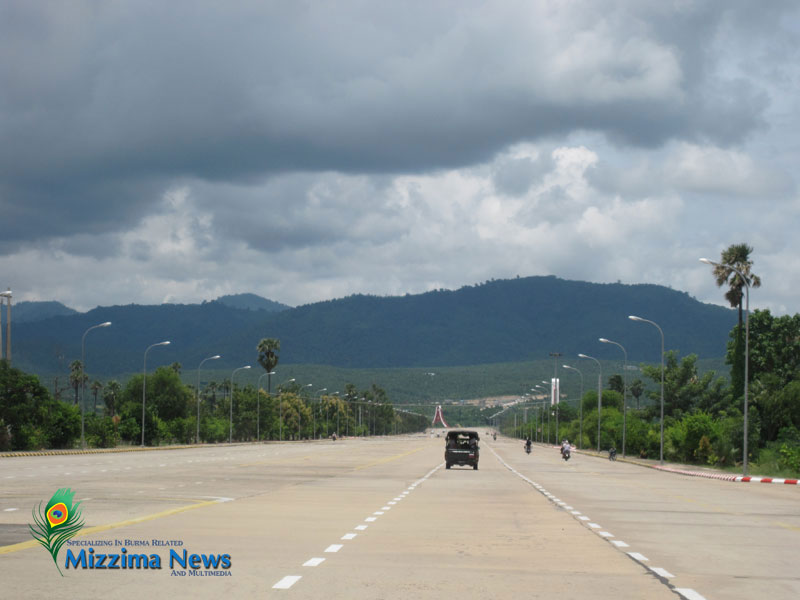Category:

The Road to Nay Pyi Taw. Photo: Mizzima
China's Belt and Road initiative conforms to the interests of both Beijing and Nay Pyi Taw. While China wants Myanmar's support to promote the initiative, infrastructural cooperation with China will benefit Myanmar's economic and societal growth.
Both countries have already made some progress on their cooperation over the Belt and Road initiative during former Myanmar president U Thein Sein's term in office. The Beijing-Nay Pyi Taw relationship has stood the test of Myanmar's leadership change and the two countries reached more consensuses on the initiative since the National League for Democracy (NLD) took office.
Beijing and Nay Pyi Taw have seen intensive high-level exchanges in recent years. Chinese Foreign Minister Wang Yi is the first high-ranking foreign official to visit Myanmar since the NLD came into office, and Myanmar's State Counsellor Aung San Suu Kyi visited Beijing in August in 2016 and will attend the upcoming Belt and Road Forum for International Cooperation in Beijing. Myanmar supports China's Belt and Road initiative, and is willing to enhance its cooperation with China in economic and infrastructural projects.
In addition, China is Myanmar's largest investor and has offered many loans to Myanmar to aid its national development. The two countries have made progress in bilateral cooperation including connectivity among facilities. A crude oil pipeline agreement was signed between China and Myanmar this April, which could help boost the local economy and the people's livelihood.
People from both countries are showing more confidence in the Belt and Road initiative. China has worked hard to gain support from Myanmar society. For instance, Chinese enterprises have attached more importance to improving the livelihood of local people; China Foundation for Poverty Alleviation provides scholarships for Myanmar students; and Chinese hospitals offer to perform eye operations for Myanmar patients.
However, there are also challenges to the advancement of the Belt and Road initiative in Myanmar. Intergovernmental communications on cooperative projects are far from perfect, and this has been detrimental to the progress of the Belt and Road initiative.
Infrastructural cooperation faces a number of obstacles as well, such as a lack of funds, land disputes, environmental concerns, border conflicts and exterior intervention. The conflicts between ethnic armed groups and the Myanmar government, in particular, have jeopardized border security and regional connectivity. Religious conflicts and terrorist attacks have also posed security threats to China-Myanmar cooperative projects.
In addition, more efforts should be put toward increasing trade volumes and upgrading trade structures between Beijing and Nay Pyi Taw. Some ports in northern Myanmar were sometimes forced to close because of armed conflicts. Moreover, the Myanmar government and ethnic armed groups take respective control of ports along the border, and this has resulted in the inconformity of port management. More efforts are needed to enhance cooperation between Chinese and Myanmar customs.
The two countries face a number of financial challenges as well. Myanmar's financial system fails to meet the international standards. The country's stock market is still underdeveloped, and it is hard for enterprises to obtain financing in Myanmar. In addition, as currency swap agreement has yet been signed between Beijing and Nay Pyi Taw, it is inconvenient for Chinese enterprises to invest in Myanmar.
Furthermore, the two countries still lack sufficient people-to-people exchanges, and a friendly and supportive atmosphere for the Belt and Road initiative has yet been established. The Myanmar public seems to have little knowledge of the Belt and Road initiative, and some radicals are prejudiced toward China, constantly protesting against China-invested projects in Myanmar. This has hindered bilateral cooperation between the two governments.
Conflicts in northern Myanmar have jeopardized border security and resulted in the deaths and injuries of Chinese civilians, which triggered the Chinese public's outcry against Myanmar. Therefore, the two countries must strengthen their people-to-people exchanges. Friendly people-to-people relationship is a prerequisite to stable China-Myanmar ties and sound infrastructural cooperation.
How to deal with the relationship among different interest groups and establish a broader community of common interests is another significant issue. China and Myanmar should work together to overcome challenges in the Belt and Road cooperation, make the initiative beneficial to more countries along the route, and prompt more countries to establish a community of common destiny for joint development and prosperity.
The author is an associate professor at China Institutes of Contemporary International Relations. opinion@ globaltimes.com.cn
Courtesy Global Times